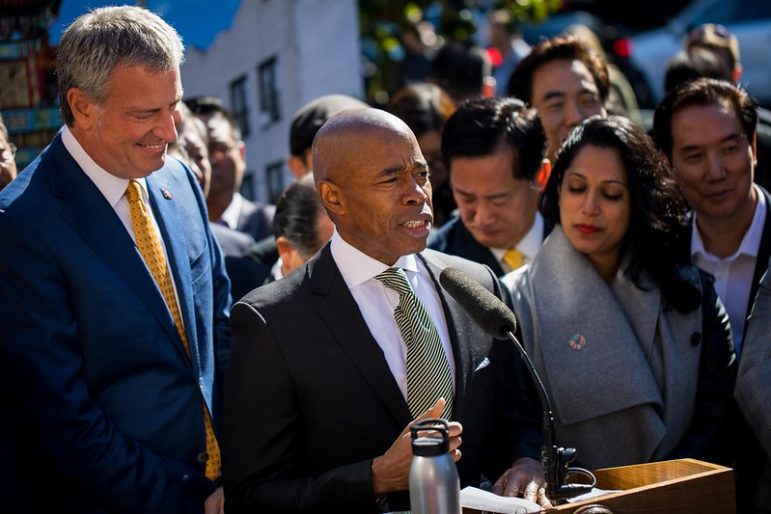“This is going to be a place where we welcome business and not turn into the dysfunctional city that we have been for so many years,” Adams said, discussing a multi-pronged plan that includes tax incentives and zoning changes to woo growing industries like cybersecurity and blockchain, and offer free or subsidized childcare for parents.

Benjamin Kanter/Mayoral Photo Office.
Brooklyn Borough President Eric Adams seen with Mayor de Blasio in 2017.Outlining his economic recovery plan for the city on Monday, Democratic mayoral hopeful Eric Adams called for increased collaboration between City Hall and private businesses, and pledged that if he became mayor, New York City would “no longer be anti-business.”
The Monday speech, which took place at the SALT Conference at Manhattan’s Javits Center, represented a major break between the sometimes adversarial approach to business taken by current Mayor Bill de Blasio.
“New York will no longer be anti-business,” Adams—who is likely to win the mayoral race because of the city’s overwhelmingly Democratic voter enrollment—said Monday morning, unveiling a multi-pronged plan that includes tax incentives and zoning changes to woo growing industries like cybersecurity and blockchain, and offer free or subsidized childcare for all parents.
“This is going to be a place where we welcome business and not turn into the dysfunctional city that we have been for so many years,” he added.
The ongoing pandemic, associated job losses, crime, homelessness and the affordable housing crisis all contribute to this coil of dysfunction, Adams, the current Brooklyn borough president, said. Each would need to be specifically addressed, both by City Hall and its partners in private business, he said.
“Government must do its job to create an environment for growth,” Adams said, outlining the key parts of his plan Monday morning. “That means lower crime. We have to curb COVID, fewer homeless on our streets, greater affordability, and partnership with the business community. We are going to create community health centers in underserved neighborhoods where COVID is still spreading to improve access to vaccines and provide preventive care to ensure better long-term health.”
Read More: ‘He’s a Bit of an Enigma’: What Eric Adams’ Development Record & Housing Plan Tell Us
Helping out-of-work New Yorkers connect with jobs was another key part of the Adams plan. He has called for the business community to work with the city to create a “common application” for job-seekers, a portal that would connect the unemployed with jobs across different sectors citywide. The city’s unemployment rate was 10.5 percent in July, down from a peak of 20 percent in May of 2020 but still up significantly from where it was pre-pandemic, at 3.8 percent.
Members of the business community who spoke with City Limits on Monday said Adams’ plan marked a likely shift in City Hall’s attitude to the economy.
“That is a comprehensive vision,” said Kathryn Wylde, the chief executive of the Partnership for New York City, of Adams’ plan. “That has not been typical—I won’t say just of de Blasio—it’s not been typical of public programs, they usually are siloed.”
“He’s really reaching out to other sectors—nonprofit and private business—to say ‘These are the problems. I need your help to solve them.’ I think that’s the key,” she added.
Adams will compete in the November general election against Republican candidate and Guardian Angels founder Curtis Sliwa.









